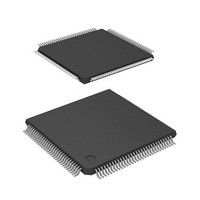DF2398TE20 Renesas Electronics America, DF2398TE20 Datasheet - Page 193

DF2398TE20
Manufacturer Part Number
DF2398TE20
Description
IC H8S MCU FLASH 256K 120TQFP
Manufacturer
Renesas Electronics America
Series
H8® H8S/2300r
Specifications of DF2398TE20
Core Processor
H8S/2000
Core Size
16-Bit
Speed
20MHz
Connectivity
SCI, SmartCard
Peripherals
DMA, POR, PWM, WDT
Number Of I /o
87
Program Memory Size
256KB (256K x 8)
Program Memory Type
FLASH
Ram Size
8K x 8
Voltage - Supply (vcc/vdd)
4.5 V ~ 5.5 V
Data Converters
A/D 8x10b; D/A 2x8b
Oscillator Type
Internal
Operating Temperature
-20°C ~ 75°C
Package / Case
120-TQFP, 120-VQFP
Lead Free Status / RoHS Status
Contains lead / RoHS non-compliant
Eeprom Size
-
Other names
HD64F2398TE20
HD64F2398TE20
HD64F2398TE20
Available stocks
Company
Part Number
Manufacturer
Quantity
Price
Company:
Part Number:
DF2398TE20V
Manufacturer:
Renesas Electronics America
Quantity:
10 000
- Current page: 193 of 1049
- Download datasheet (5Mb)
6.11.3
Even if a bus request is received from a bus master with a higher priority than that of the bus master that has acquired the
bus and is currently operating, the bus is not necessarily transferred immediately. There are specific times at which each
bus master can relinquish the bus.
CPU: The CPU is the lowest-priority bus master, and if a bus request is received from the DTC or DMAC, the bus arbiter
transfers the bus to the bus master that issued the request. The timing for transfer of the bus is as follows:
DTC: The DTC sends the bus arbiter a request for the bus when an activation request is generated.
The DTC can release the bus after a vector read, a register information read (3 states), a single data transfer, or a register
information write (3 states). It does not release the bus during a register information read (3 states), a single data transfer,
or a register information write (3 states).
DMAC: The DMAC sends the bus arbiter a request for the bus when an activation request is generated.
In the case of an external request in short address mode or normal mode, and in cycle steal mode, the DMAC releases the
bus after a single transfer.
In block transfer mode, it releases the bus after transfer of one block, and in burst mode, after completion of a transfer.
6.11.4
External bus release can be performed on completion of an external bus cycle. The RD signal, DRAM interface RAS and
CAS signals remain low until the end of the external bus cycle. Therefore, when external bus release is performed, the
RD, RAS, and CAS signals may change from the low level to the high-impedance state.
The bus is transferred at a break between bus cycles. However, if a bus cycle is executed in discrete operations, as in
the case of a longword-size access, the bus is not transferred between the operations. See Appendix A.5, Bus States
during Instruction Execution, for timings at which the bus is not transferred.
If the CPU is in sleep mode, it transfers the bus immediately.
Bus Transfer Timing
External Bus Release Usage Note
Rev.6.00 Oct.28.2004 page 163 of 1016
REJ09B0138-0600H
Related parts for DF2398TE20
Image
Part Number
Description
Manufacturer
Datasheet
Request
R

Part Number:
Description:
CONN PLUG 12POS DUAL 0.5MM SMD
Manufacturer:
Hirose Electric Co Ltd
Datasheet:

Part Number:
Description:
CONN PLUG 18POS DUAL 0.5MM SMD
Manufacturer:
Hirose Electric Co Ltd
Datasheet:

Part Number:
Description:
CONN PLUG 14POS DUAL 0.5MM SMD
Manufacturer:
Hirose Electric Co Ltd
Datasheet:

Part Number:
Description:
CONN RECEPT 20POS DUAL 0.5MM SMD
Manufacturer:
Hirose Electric Co Ltd
Datasheet:

Part Number:
Description:
CONN PLUG 16POS DUAL 0.5MM SMD
Manufacturer:
Hirose Electric Co Ltd
Datasheet:

Part Number:
Description:
CONN RECEPT 16POS DUAL 0.5MM SMD
Manufacturer:
Hirose Electric Co Ltd
Datasheet:

Part Number:
Description:
CONN PLUG 20POS DUAL 0.5MM SMD
Manufacturer:
Hirose Electric Co Ltd
Datasheet:

Part Number:
Description:
CONN PLUG 30POS DUAL 0.5MM SMD
Manufacturer:
Hirose Electric Co Ltd
Datasheet:

Part Number:
Description:
CONN RECEPT 30POS DUAL 0.5MM SMD
Manufacturer:
Hirose Electric Co Ltd
Datasheet:

Part Number:
Description:
CONN PLUG 40POS DUAL 0.5MM SMD
Manufacturer:
Hirose Electric Co Ltd
Datasheet:

Part Number:
Description:
KIT STARTER FOR M16C/29
Manufacturer:
Renesas Electronics America
Datasheet:

Part Number:
Description:
KIT STARTER FOR R8C/2D
Manufacturer:
Renesas Electronics America
Datasheet:

Part Number:
Description:
R0K33062P STARTER KIT
Manufacturer:
Renesas Electronics America
Datasheet:

Part Number:
Description:
KIT STARTER FOR R8C/23 E8A
Manufacturer:
Renesas Electronics America
Datasheet:

Part Number:
Description:
KIT STARTER FOR R8C/25
Manufacturer:
Renesas Electronics America
Datasheet:











